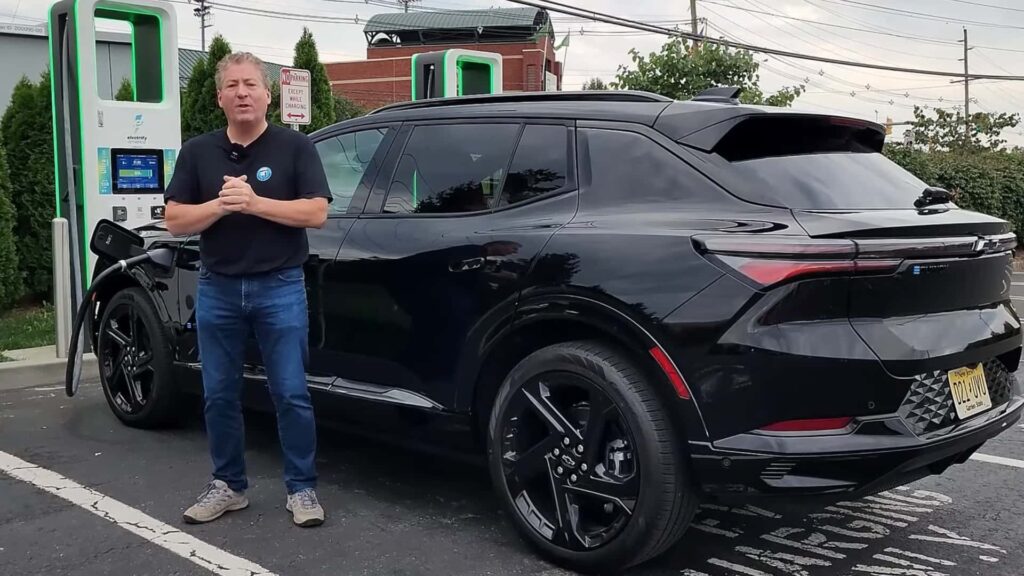The Chevrolet Equinox EV is a popular electric vehicle that offers great value for money. However, one of the major drawbacks of this vehicle is its slow charging times. Despite being marketed as having a high-voltage battery pack, the Equinox EV’s battery voltage never goes over 400 V, even when fully charged. This limitation results in longer charging times than expected for a modern EV.
To test the charging capabilities of the Equinox EV, charging expert Tom Moloughney decided to try out three different fast chargers: a 150 kW Electrify America stall, a 250 kW Tesla Supercharger, and a 350 kW EVgo ultra-fast charger. Surprisingly, the 250 kW Tesla Supercharger provided the fastest charging session, outperforming the more powerful 350 kW EVgo charger.
During the charging session at the 150 kW Electrify America stall, the Equinox EV was only able to reach a maximum power level of 96 kW, resulting in a slow 44-minute charging session to go from 10% to 80% state of charge. The stall’s inability to deliver the required amperage and voltage for the Equinox EV meant that the car could not reach its maximum charging speed.
In contrast, the 250 kW Tesla Supercharger proved to be the most efficient charger for the Equinox EV. Despite being less powerful than the 350 kW EVgo charger, the Tesla Supercharger maintained a power level of over 100 kW for longer, leading to a total charging time of just 40 minutes to go from 10% to 80% state of charge.
The 350 kW EVgo charger, on the other hand, started throttling the power after 14 minutes of charging, dropping below 100 kW after 16 minutes. Ultimately, the 350 kW station took one more minute than the 250 kW Tesla Supercharger to charge the Equinox EV up to 80%.
In conclusion, when it comes to charging the Equinox EV, it makes sense to opt for DC fast chargers that offer over 200 kW. This is because the car requires a higher amperage to fully utilize its charging capabilities. Despite the higher power rating of the 350 kW charger, the 250 kW Tesla Supercharger proved to be more efficient in charging the Equinox EV in a shorter amount of time. When it comes to DC fast chargers, there are a few different options available on the market, including 150 kW, 250 kW, and 350 kW chargers. While these chargers may vary in power output, the differences in terms of charging times are actually quite small. In fact, the fastest charger only takes five minutes less than the slowest charger to fully charge a vehicle.
One of the main factors that determine the charging time of a DC fast charger is the power output. A 150 kW charger will typically take around 30 minutes to charge a vehicle, while a 250 kW charger can do the same job in just 25 minutes. The fastest option, the 350 kW charger, can fully charge a vehicle in as little as 20 minutes. While this five-minute difference may seem significant, it is relatively small when considering the overall charging time.
Another factor to consider when choosing a DC fast charger is the compatibility with your vehicle. Not all vehicles are capable of charging at 350 kW, so it’s important to check the specifications of your vehicle before investing in a high-powered charger. Additionally, some vehicles may have built-in limitations on charging speed, so even if you have a 350 kW charger, you may not be able to take full advantage of its capabilities.
In terms of cost, 350 kW chargers are typically more expensive to install and operate than lower-powered options. However, if you have a vehicle that is capable of charging at this speed and you frequently need to recharge quickly, the investment may be worth it in the long run.
Overall, the differences between 150 kW, 250 kW, and 350 kW DC fast chargers are minimal in terms of charging times. While the fastest charger may be more convenient for some users, it may not be necessary for everyone. It’s important to consider your vehicle’s capabilities and your charging needs before deciding on the right charger for you.

